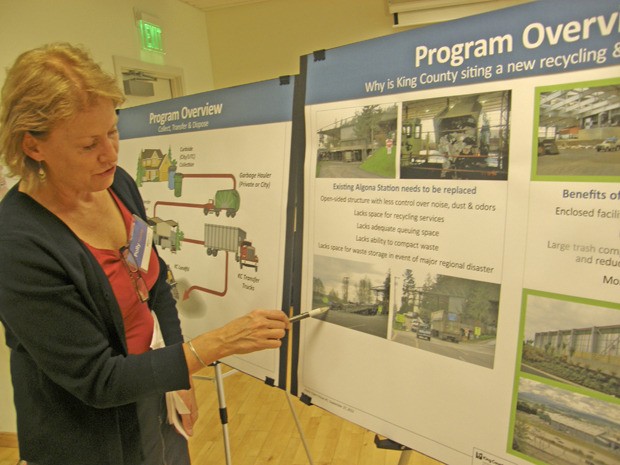Auburn Mayor Pete Lewis said his City wasn’t interested in becoming the site for the Algona solid waste transfer station’s replacement — whether east of the Supermall, or west of Lowe’s.
The Auburn City Council, the mayor added, was to have drafted a resolution last Monday, crystallizing its opposition.
Federal Way resident Robert Yates, whose city is also on King County’s short list, said he doesn’t see why officials are talking about replacing the Algona station, and went a step further, calling the county’s replacement program a waste of taxpayers’ money.
“What we have has lasted 50 years and is working fine,” Yates said. “Is there a need for rebuilding these things? No, because garbage trucks have never had any problems. They spend maybe five minutes, they dump their load and they’re gone. All of a sudden, there’s a need? For what?”
“I detect either incompetence or corruption, because there are big, big amounts of money that are going to be spent to build these grand and glorious facilities, and there’s no need for it,” Yates said.
Yates and Lewis were among 50 to 60 residents and local elected officials who showed up for an open house at the Auburn Senior Activity Center last week after King County announced plans to replace the outdated Algona solid waste transfer station by 2018.
The county’s Municipal Solid Waste Management Advisory Committee presented its list of five prospects, among them two 19-acre commercial properties, one just west of Lowe’s, the other east of the Supermall.
The leading candidate is said to be in Algona.
King County put together its committee more than two years ago to examine and grade existing transfer stations. Committee members examined, wrote information down, pondered, looked again, compared — and stamped many of the stations “deficient.”
The Algona station was critiqued for lacking space for vehicles to line up, extended wait times, inability to compact waste, absence of recycling services and other “service deficiencies.” King County’s Solid Waste Transfer and Waste Management Plan calls for its replacement.
The rub, of course, is where.
King County Solid Waste Division has pared the candidates to the locations centrally located, Polly Young, a public involvement coordinator for KCSWD told the audience, to accommodate the south end’s solid waste service area.
But nothing is final.
“I want to make sure you know that no decisions have been made about the siting, whatsoever. We’re still in the information-gathering stage, and that’s why we need to hear from you. … This is exactly why we’re here. To get your input,” Young said.
Eric Richardt of the King County Solid Waste Division noted that modern transfer stations are typically enclosed, ensuring that noise and dust are not really noticeable side effects for residents nearby.
Auburn City Councilman John Holman said he is concerned the issue would degenerate to a battle overwrought with emotion when cool heads are needed.
“… We’re talking about economic development, we’re talking about removing prime property from the tax rolls, we’re talking about not getting income to offset the wear and tear on the roadways,” Holman said. “Site A in Auburn on the north end is next to a daycare, one of the largest in Auburn and has the Shag senior apartment building next to it. It’s also on the approach-departure corridor for Auburn Airport, and birds, garbage and airplanes don’t mix”
Federal Way City Councilwoman Dini Duclos said Federal Way’s principal concern with the the 320th Street site is its possible traffic impact, and how it may affect a new South King Fire and Rescue building nearby.
“It’s very close to the city, right off I-5 and 320th, which is a major entryway for access into the city and has major congestion already,” Duclos said. “There’s a huge concern about safety. Because the fire department is right across the street, and when that alarm goes off and there’s a traffic jam and there are trucks out there, and they’re delayed to getting wherever they have to get to, the liability costs will be astronomical against the county.”



